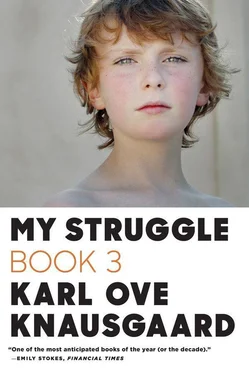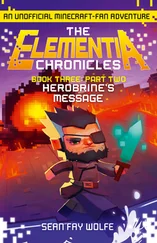“Where have you been?” one said.
“Fina,” I said.
“What were you doing there?” the other said.
“Nothing,” I said, moving off.
They stepped to the side so that I couldn’t get past.
“Get out of the way,” I said. “I’m going home.”
“What have you got in the bag?”
“Nothing.”
“Oh yes, you have. Fox and Nox. We can see.”
“And? I’ve bought them for my brother. He’s eleven.”
“Give them to us.”
“No-oo,” I said.
One of them, Tom’s sister, made a grab for the bag. I swung it to the side. The other girl pushed with both arms and sent me flying.
“Give us the bag,” she said.
“No,” I said, wrapping my arms round it while struggling to get to my feet.
She pushed me again. I fell headlong and started crying.
“They’re mine!” I shouted. “You can’t have them!”
“Thought they were supposed to be your brother’s,” one of them said, grabbing the bag and yanking it out of my hands. Then they ran across the grass as fast as they could to the road, laughing all the while.
“They’re mine!” I yelled after them. “They’re mine!”
I cried all the way home.
They had stolen my candy. How was that possible? How could they just come up to me and take them? They were mine! I had been given the money by Dad and walked all the way to the Fina station and back! And they just came and took them! Pushed me over! How could they do that?
Approaching my house, I wiped my face on my sweater sleeves, blinked a few times, and shook my head a bit so that no one would see I had been crying.
Once when I was five, Trond’s little sister, Wenche, threw a rock at me, right into my stomach. I burst into tears and ran over to our garden fence, where Dad was working. I was sure he would help me, but he wouldn’t, on the contrary, he said not only was Wenche a girl, she was also a year younger than me, it was nothing to snivel about. He said I embarrassed him and I should fight back, surely I understood that. But I didn’t. Everyone knew it was wrong to throw stones, didn’t they? And that fighting back was bad, a last resort?
Not Dad, though, no. He stood there with his stern gaze, and his folded arms, looking across the road to where all the children were playing, nodded his head, and said I should carry on playing and stop bothering him.
And since it was girls who had stolen my candy, there was no hope of any help from Dad.
I stood still in the hallway, listened, removed my shoes, put them by the wall, walked carefully upstairs, and into Yngve’s room while the thought of all the lost Foxes and Noxes hit me with renewed force, and again the tears began to roll down my cheeks.
Yngve was lying on his stomach on the bed reading a copy of Buster with his legs in the air. He had emptied a bag of candy.
“What are you crying about?” he said.
I told him what had happened.
“Couldn’t you just have run off?” he said.
“No, they were in my way.”
“They pushed you. Couldn’t you have pushed them?”
“No, they were much bigger and stronger than me,” I sobbed.
“Surely you don’t have to blub like that because of it,” Yngve said. “Would it help if I gave you some of mine?”
“Ye-e-s,” I hiccuped.
“Not a lot, though. But some. This one and this one and this one and this one, for example. And maybe this one. There you go. Is that better now?”
“Yes,” I said. “Can I sit here as well?”
“You can sit here until you’ve eaten these. Then you’ve got to go.”
“OK.”
After I had eaten the candy and washed my face in cold water it felt as if I was starting afresh. Mom was in the kitchen, I could hear, she was cooking, the fan was blowing. All the time I had been upstairs I hadn’t heard anything from Dad, so he must have been in his study.
I went into the kitchen and sat down on a chair.
“Did you buy some candy today?” Mom asked. She was standing by the stove and turning what was probably minced meat in the frying pan. It was sizzling and spitting. There was a pan on the other plate hissing away inaudibly, drowned by the noise of the fan.
“Yup,” I said.
“Did you go all the way down to the Fina station?” She always said, “the Fina station,” never just “Fina,” as we did.
“Yes,” I said. “What are we having?”
“Casserole with rice, I thought.”
“And pineapples?” She smiled.
“No, not pineapples. That’s a Mexican dish.”
“Oh, yes.”
There was a pause. Mom tore open a bag and poured the contents over the meat, then she measured some water in a jug and poured that on top. As soon as that was done, the water was bubbling in the pan and she poured in the rice. She sat down at the other side of the table, pressed her hands against her back, and stretched.
“What do you actually do in Kokkeplassen?” I said.
“Surely you know, don’t you? You’ve been there many times.”
“You take care of the people living there.”
“Yes, you could put it like that.”
“But why are they there, actually? Why don’t they live at home?”
She considered that question at length. Indeed, she thought for so long that my mind was on other things by the time she answered.
“Many of the people who live there suffer from anxiety. Do you know what that is?”
I shook my head.
“It’s when you’re afraid of something and you don’t know what it is.”
“Are they afraid all the time?”
She nodded.
“Yes, they are. And then I talk to them. Do a variety of activities with them to make them less afraid.”
“But …,” I said. “Aren’t they afraid of one thing in particular? Or are they just afraid?”
“Yes, that’s exactly how it is. They’re just afraid. But then it passes and then they move back home.”
There was another pause.
“Why did you ask about that? Is it something you’ve been wondering about?”
“Nope. It was Frøken. We had to tell her what our parents did. I said you worked at Kokkeplassen, and she asked what you did there. I wasn’t a hundred percent sure. But do you know what Geir said? He said his mother taught the people who were where she worked to tie their shoelaces!”
“That’s a good way of putting it. The ones she works with aren’t afraid. But they have difficulty doing the little chores we take for granted. Like cooking and washing. And getting dressed. So Martha goes there and helps them.”
She got up and stirred the pot.
“They’re loonies, aren’t they?” I said.
“Mentally handicapped is the expression,” she said, looking at me. “Loony is a very ugly word.”
“Is it?”
“Yes.”
A door opened on the floor below.
“I’m going to see Yngve,” I said, getting up.
“You do that,” Mom said.
I walked as fast as I could without running. If I set off as soon as I heard the first door I would reach Yngve’s room before Dad had come up the stairs and seen me. If I set off when I heard the second door he would see me.
Now I could hear the first footstep on the stairs as I closed the door behind me.
Yngve was still on his bed reading. He had a soccer magazine now.
“Food ready soon?” he said.
“I think so,” I said. “Can I borrow a comic?”
“Help yourself,” he said. “But be gentle with it.”
Dad walked past outside. I bent down over the pile of comic books on the shelf. He kept his comics in collections, so The Phantom was in a file, for example, while mine lay all strewn about. He was also a member of the Phantom Club.
“Can I take the whole file?” I said.
“Out of the question,” he said.
Читать дальше












